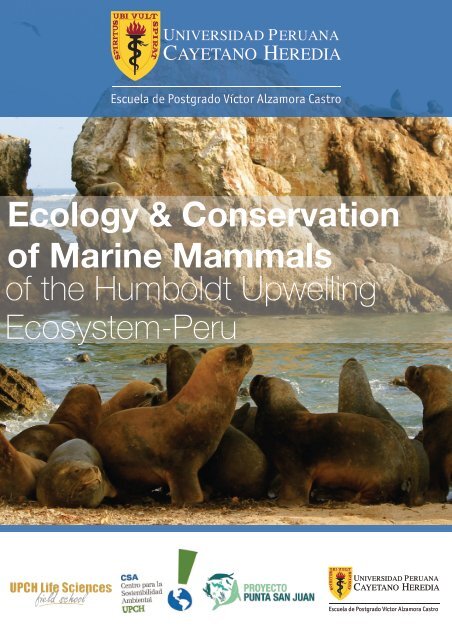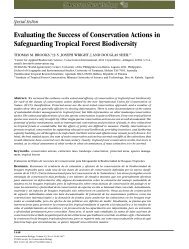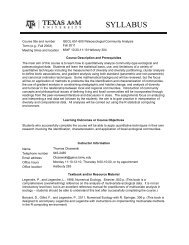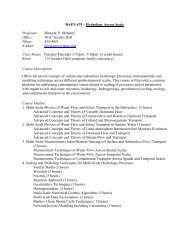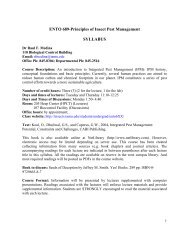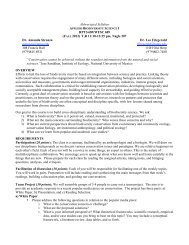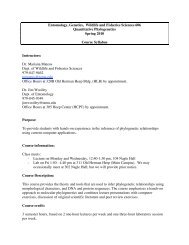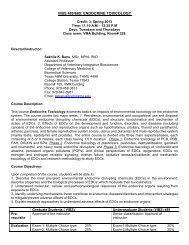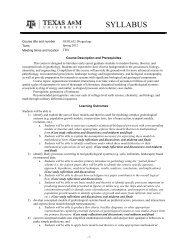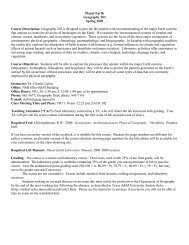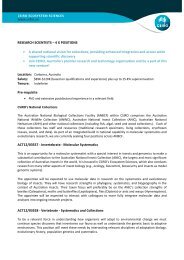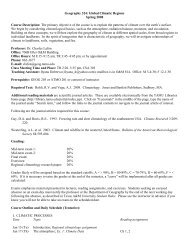Marine mammals field course in Peru - Ecology and Evolutionary ...
Marine mammals field course in Peru - Ecology and Evolutionary ...
Marine mammals field course in Peru - Ecology and Evolutionary ...
You also want an ePaper? Increase the reach of your titles
YUMPU automatically turns print PDFs into web optimized ePapers that Google loves.
Escuela de Postgrado Víctor Alzamora Castro<br />
<strong>Ecology</strong> & Conservation<br />
of <strong>Mar<strong>in</strong>e</strong> Mammals<br />
of the Humboldt Upwell<strong>in</strong>g<br />
Ecosystem-<strong>Peru</strong><br />
Escuela de Postgrado Víctor Alzamora Castro
Presentation :<br />
This is a residential <strong>field</strong>-based <strong>course</strong> <strong>in</strong> <strong>Peru</strong> on the biology, anatomy, physiology,<br />
ecology, evolution, behavior, population biology, management <strong>and</strong> conservation of<br />
mar<strong>in</strong>e <strong>mammals</strong>, expla<strong>in</strong><strong>in</strong>g why this group is so important, controversial <strong>and</strong><br />
<strong>in</strong>terest<strong>in</strong>g.<br />
Students will be provided with a comprehensive knowledge on mar<strong>in</strong>e mammal<br />
ecology with special enphasis on species <strong>in</strong>habit<strong>in</strong>g the Humboldt Current Upwell<strong>in</strong>g<br />
Ecosystem off the coast of <strong>Peru</strong> -a develop<strong>in</strong>g country <strong>in</strong> with the largest s<strong>in</strong>gle species<br />
fishery <strong>in</strong> the world.<br />
This is a university-accredited <strong>course</strong> <strong>and</strong> is <strong>in</strong>tended for students <strong>in</strong> the summer<br />
vacation <strong>and</strong> for enthusiastic <strong>in</strong>dividuals with keen <strong>in</strong>terest <strong>in</strong> the mar<strong>in</strong>e environment.<br />
This <strong>course</strong> is suitable for MSc., undergraduate students <strong>in</strong> the last 3 years of study <strong>and</strong><br />
<strong>in</strong>dividuals who want to learn from experts about the ecology <strong>and</strong> conservation of sea<br />
lions, fur seals, dolph<strong>in</strong>s, whales, mar<strong>in</strong>e otters of the south Pacific Ocean.<br />
The <strong>course</strong> will take place <strong>in</strong> Lima <strong>and</strong> <strong>in</strong> Punta San Juan. Lima is the capital <strong>and</strong> largest<br />
city of <strong>Peru</strong>, one of the top mega diverse countries <strong>and</strong> home of the Cayetano Heredia<br />
University, the local host <strong>in</strong>stitution.<br />
Punta San Juan (15º22'S, 75º12'W) is a 54 hectare (133 acres) headl<strong>and</strong> located <strong>in</strong><br />
the town of Marcona 500 km south of Lima. Punta San Juan has been protected for<br />
more than 60 years by the <strong>Peru</strong>vian government for the exploitation of guano, a<br />
natural fertilizer made from seabird dropp<strong>in</strong>gs.<br />
Dur<strong>in</strong>g the 8 full days <strong>in</strong> the <strong>field</strong>, students will be exposed to lectures, <strong>field</strong>work, data<br />
collection <strong>and</strong> analysis on resident mar<strong>in</strong>e <strong>mammals</strong> while be<strong>in</strong>g lodged at the<br />
oceanfront <strong>field</strong> station.<br />
www.upch.edu.pe/epgvac/
<strong>Ecology</strong> & Conservation of <strong>Mar<strong>in</strong>e</strong> Mammals<br />
of the Humboldt Upwell<strong>in</strong>g Ecosystem-<strong>Peru</strong><br />
Objective :<br />
By the end of this <strong>course</strong>, students will be able to:<br />
Underst<strong>and</strong> concepts of mar<strong>in</strong>e mammal biology<br />
<strong>and</strong> ecology.<br />
Design <strong>and</strong> collect behavioral data on wild<br />
populations of mar<strong>in</strong>e <strong>mammals</strong>.<br />
Respond critically to mar<strong>in</strong>e conservation issues <strong>in</strong><br />
a develop<strong>in</strong>g country with the largest s<strong>in</strong>gle<br />
species fishery.<br />
Assessment :<br />
This <strong>course</strong> is open to students from different<br />
universities world wite. All students will be<br />
evaluated by <strong>course</strong> <strong>in</strong>structors accord<strong>in</strong>g to<br />
participation (25%), group discussions (25%),<br />
groups <strong>field</strong> project (30%) <strong>and</strong> project<br />
presentation (30%).<br />
Prerequisites :<br />
University level students should be at the last 3<br />
years of undergraduate studies. It is<br />
recommended an <strong>in</strong>troductory <strong>course</strong> <strong>in</strong><br />
vertebrate biology or mar<strong>in</strong>e biology. Students<br />
at other levels should have a general knowledge<br />
of mar<strong>in</strong>e life <strong>and</strong> experience <strong>in</strong> vertebrate<br />
biology is desirable.<br />
www.upch.edu.pe/epgvac/
<strong>Ecology</strong> & Conservation of <strong>Mar<strong>in</strong>e</strong> Mammals<br />
of the Humboldt Upwell<strong>in</strong>g Ecosystem-<strong>Peru</strong><br />
Study Plan :<br />
MODULE 1: Humboldt Current Ecosystem<br />
This module will cover topics <strong>in</strong> the abiotic about abiotic<br />
features of the Humboldt Current Ecosystem off <strong>Peru</strong><br />
<strong>and</strong> the major human activities tak<strong>in</strong>g place <strong>in</strong> this locality<br />
mar<strong>in</strong>e (i.e., anchoveta fishery, fish meal plants, etc.).<br />
MODULE 2: Topics <strong>in</strong> <strong>Mar<strong>in</strong>e</strong> Mammal Biology<br />
In this module cover topics on basic biology, ecology,<br />
anatomy, physiology, evolution, behaviour <strong>and</strong><br />
population biology of mar<strong>in</strong>e <strong>mammals</strong> with emphasis on<br />
the species liv<strong>in</strong>g on the coast off the Humboldt Current<br />
Upwell<strong>in</strong>g Ecosystem.<br />
MODULE 3: Field projects: design <strong>and</strong> data<br />
collection<br />
In this module will be presented several methods on how<br />
to design <strong>and</strong> collect data <strong>in</strong> the <strong>field</strong> on mar<strong>in</strong>e <strong>mammals</strong><br />
through observation <strong>and</strong> sample collection <strong>in</strong> situ.<br />
MODULE 4: Critical th<strong>in</strong>k<strong>in</strong>g: <strong>Mar<strong>in</strong>e</strong> conservation<br />
science <strong>and</strong> policy<br />
This module will cover current issues of mar<strong>in</strong>e<br />
conservation at a global <strong>and</strong> local scale (Humboldt<br />
Current Ecosystem) through presentation of case<br />
studies <strong>and</strong> group discussions. Students will th<strong>in</strong>k on<br />
how to apply a project <strong>in</strong> mar<strong>in</strong>e mammal conservation <strong>in</strong><br />
a country like <strong>Peru</strong>.<br />
www.upch.edu.pe/epgvac/
<strong>Ecology</strong> & Conservation of <strong>Mar<strong>in</strong>e</strong> Mammals<br />
of the Humboldt Upwell<strong>in</strong>g Ecosystem-<strong>Peru</strong><br />
Ma<strong>in</strong> teachers :<br />
Monica Muelbert, PhD.<br />
Dr. Muelbert was born <strong>in</strong> Brazil <strong>and</strong> then studied her PhD at Dalhousie University<br />
(Canada) on size at wean<strong>in</strong>g <strong>in</strong> harbor seals. She is currently professor <strong>and</strong><br />
supervisor at the Postgraduate Program <strong>in</strong> Biological Oceanography at the<br />
Federal University of Rio Gr<strong>and</strong>e, Brazil. Monica is found<strong>in</strong>g member of the Lat<strong>in</strong><br />
American Society of Specialists on Aquatic Mammals (SOLAMAC), Ad hoc<br />
consultant for Brazil National Scientific Council, member of the Expert Group on<br />
Birds <strong>and</strong> <strong>Mar<strong>in</strong>e</strong> Mammals for the Scientific Committee for Antarctic Research<br />
(SCAR-EGBMM), <strong>and</strong> others.<br />
Patricia Majluf, PhD.<br />
Dr. Majluf was born <strong>in</strong> <strong>Peru</strong> <strong>and</strong> then studied her PhD at University of Cambridge<br />
(UK) on reproductive ecology of South American fur seals. She is founder <strong>and</strong><br />
director of the Centre for Environmental Susta<strong>in</strong>ability at the Cayetano Heredia<br />
University (CSA-UPCH) <strong>in</strong> Lima, <strong>Peru</strong>. Patricia is found<strong>in</strong>g member of the<br />
SOLAMAC, associate research scientist for the Wildlife Conservation Society<br />
(20yrs). She has received various grants <strong>and</strong> awards for mar<strong>in</strong>e conservation <strong>in</strong><br />
<strong>Peru</strong> (Whitley Fund for Nature, BBVA <strong>and</strong> others) <strong>and</strong> has recently been <strong>in</strong>vited<br />
to act as PEW fellow.<br />
Bob Brownell, PhD.<br />
Dr. Brownell received his Ph.D. from the University of Tokyo (Japan) <strong>and</strong> has<br />
conducted research on the biology <strong>and</strong> conservation of whales, dolph<strong>in</strong>s <strong>and</strong><br />
porpoises throughout the world. Dr. Brownell is a Senior Scientist for International<br />
Protected Resources with NOAA Fisheries at the Southwest Fisheries Science<br />
Center <strong>in</strong> California, USA. Bob has been a member of the U.S. delegation to the<br />
International Whal<strong>in</strong>g Commission (IWC), President of the Society for <strong>Mar<strong>in</strong>e</strong><br />
Mammalogy, <strong>and</strong> has published close to 200 scientific papers, book chapters,<br />
<strong>and</strong> management documents on various aspects of whale, dolph<strong>in</strong>, <strong>and</strong> porpoise<br />
biology, conservation, <strong>and</strong> management.<br />
Susana Cárdenas-Alayza, MSc.<br />
Ms. Cárdenas-Alayza MSc. degree <strong>in</strong> Zoology from the University of British<br />
Columbia (Canada) with research on prey abundance <strong>and</strong> population dynamics<br />
of South American fur seals. Susana is currently director of the Punta San Juan<br />
Project, associate researcher of the CSA-UPCH <strong>and</strong> Coord<strong>in</strong>ator for Field<br />
Programs <strong>in</strong> <strong>Peru</strong> for the Chicago Zoological Society. Ms. Cárdenas-Alayza is a<br />
current member of the p<strong>in</strong>niped specialist group for IUCN, member of the<br />
Society for <strong>Mar<strong>in</strong>e</strong> Mammalogy, <strong>and</strong> others.
Cost :<br />
<strong>Ecology</strong> & Conservation of <strong>Mar<strong>in</strong>e</strong> Mammals<br />
of the Humboldt Upwell<strong>in</strong>g Ecosystem-<strong>Peru</strong><br />
$ 1,800 US dollars<br />
DOES INCLUDE<br />
Transport to <strong>and</strong> from the Lima airport<br />
Lodg<strong>in</strong>g <strong>in</strong> Lima dur<strong>in</strong>g the <strong>course</strong><br />
Round trip from Lima to the<br />
Punta San Juan <strong>field</strong> site<br />
Lodg<strong>in</strong>g, meals <strong>and</strong> transport<br />
at the <strong>field</strong> site<br />
Tuition<br />
Adm<strong>in</strong>istrative fees<br />
Course materials<br />
Course certificate<br />
Course Schedule :<br />
Day 1. Saturday, Aug 3rd<br />
DOES NOT INCLUDE<br />
Travel from home country to <strong>Peru</strong><br />
Visa costs<br />
M<strong>and</strong>atory <strong>in</strong>ternational<br />
accident <strong>and</strong> health <strong>in</strong>surance<br />
Personal expenses. It is suggested<br />
students br<strong>in</strong>g at least $300US<br />
for personal spend<strong>in</strong>g money<br />
Onl<strong>in</strong>e transaction fee or bank-tobank<br />
wire transfer fees (fees may<br />
vary accord<strong>in</strong>g to your bank)<br />
Course <strong>in</strong>troduction <strong>and</strong> oppen<strong>in</strong>g lectures at university campus<br />
(Miraflores) all morn<strong>in</strong>g. Lunch with students <strong>and</strong> teachers on campus.<br />
Students will be transported to bus term<strong>in</strong>al to go the <strong>field</strong> on Saturday<br />
night.<br />
Days 2-9. Sunday, Aug 4th - Sunday, Aug 11th<br />
Residential <strong>field</strong> <strong>course</strong> at the Punta San Juan guano reserve <strong>in</strong> Ica. All<br />
lodg<strong>in</strong>g, transport <strong>and</strong> meals will be provided. Transport to <strong>field</strong> site is<br />
overnight, departure at 9pm <strong>and</strong> 6am arrival. Students will travel <strong>in</strong><br />
country with teachers at all times.<br />
Day 10. Monday, Aug 12th<br />
Clos<strong>in</strong>g lectures at university campus (Miraflores) all morn<strong>in</strong>g. Lunch<br />
with students <strong>and</strong> teachers on campus.<br />
www.upch.edu.pe/epgvac/
Important Dates :<br />
Registration April 15th to June 30th, 2013<br />
Duration August 3rd to August 12th, 2013<br />
Payments:<br />
You can pay for this <strong>course</strong> at our onl<strong>in</strong>e store: http://store.upch.edu.pe<br />
*All students must pay <strong>course</strong> fee by June 30th 2013.<br />
Informations <strong>and</strong> Registration<br />
Escuela de Postgrado Víctor Alzamora Castro<br />
Phones: (51-1) 626 9401 anexo 1138<br />
Phones: (51-1) 619-7700 anexo 3435 - 3437<br />
E-mail: claudia.castillo.c@upch.pe<br />
scardenas@csa-upch.edu.pe<br />
admision.postgrado@ofic<strong>in</strong>as-upch.pe<br />
www.upch.edu.pe/epgvac/<br />
www.upch.edu.pe/epgvac/<br />
Escuela de Postgrado Víctor Alzamora Castro


